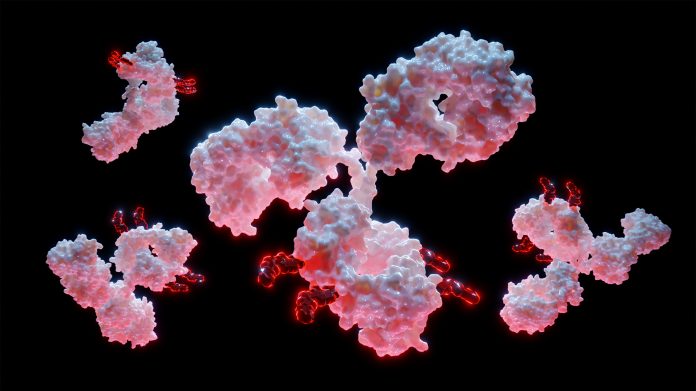
Two new deals around antibody drug conjugates (ADCs) were just struck. Pfizer will develop and commercialize Nona Biosciences’ MSLN-targeted ADC HBM9033 in a deal worth potentially $1B+. Meanwhile, Biocytogen Pharmaceuticals announced an antibody evaluation, option, and license agreement with Ona Therapeutics. The deal includes an option to exclusively license selected antibodies for ADC development. Financial terms were not disclosed.
The global market for ADCs is already worth several billion dollars, and is expected to grow considerably over the next decade. There are over 100 of these drugs in clinical trials.
There have been several deals worth potentially $1B or more around such drug candidates this year. In early April, BioNTech struck a deal with Duality Biologics worth up to $1.5B. Soon after, Bristol Myers Squibb signed a deal worth up to $1B for Tubulis to use the biotech’s “PS conjugation platform” to develop ADCs against solid tumors. In May, Eisai inked a clinical trial collaboration worth up to $2B with Bliss Biopharmaceutical. The biggest deal of all was Pfizer’s $43B acquisition of ADC specialist Seagen in March which doubled Pfizer’s early-stage oncology clinical pipeline. Daiichi Sankyo has several ADCs in development and the blockbuster Enhertu, which it developed with AstraZeneca.
Nona will receive a total of up to $53 million in upfront and near-term payments, from Pfizer with the potential for additional payments of up to $1.05 billion upon achieving certain development and commercial milestones. Nona is also eligible to receive tiered royalties on net sales ranging from high single digits to high teens.
“This agreement represents a significant milestone in the advancement of our proprietary Harbour Mice platform and the ADC ecosystem, affirming Nona’s robust capabilities and expertise in antibody discovery and development. This partnership with Pfizer further enhances Nona’s global network of collaborations through innovative models, thereby amplifying the scientific and commercial value of our technology platforms,” said Jingsong Wang, MD, PhD, chairman of Nona Biosciences.
HBM9033 specifically targets human MSLN, a tumor-associated antigen (TAA) upregulated in various solid tumors. The fully human monoclonal antibody in HBM9033 is derived from the Harbour Mice platform and, Nona says, “possesses well-tuned properties, exhibiting reduced binding to shedding MSLN (sMSLN) while maintaining strong binding and internalization to membrane-bound MSLN.”
Meanwhile, under the terms of their agreement, Biocytogen will grant Ona access to evaluate Biocytogen’s proprietary RenMice-derived fully human antibodies against a specific tumor target.
Biocytogen will receive an upfront payment for granting the option, and will be further entitled to an option-exercise fee, development and commercialization milestone payments, as well as single-digit royalties on net sales once Ona elects to exercise the option in full.
Yuelei Shen, president and CEO of Biocytogen, said, “As part of Project Integrum, Biocytogen has been discovering fully human antibodies against 200 TAA targets based on their internalization activity. We are honored that Ona, among other global biopharmaceutical companies, recognizes the potential of our proprietary off-the-shelf antibodies. We believe Ona’s deep understanding of novel mechanisms of resistance in advanced cancer and their capabilities in ADC design and development will accelerate the development of our antibodies into promising therapeutics.”
Valerie Vanhooren, CEO & co-founder of Ona, said, “We believe the combination of Biocytogen’s rich antibody repertoire with Ona’s unique insight in advanced cancer biology will have great advantages in the discovering and developing of first-in-class molecules for unmet medical needs.”













